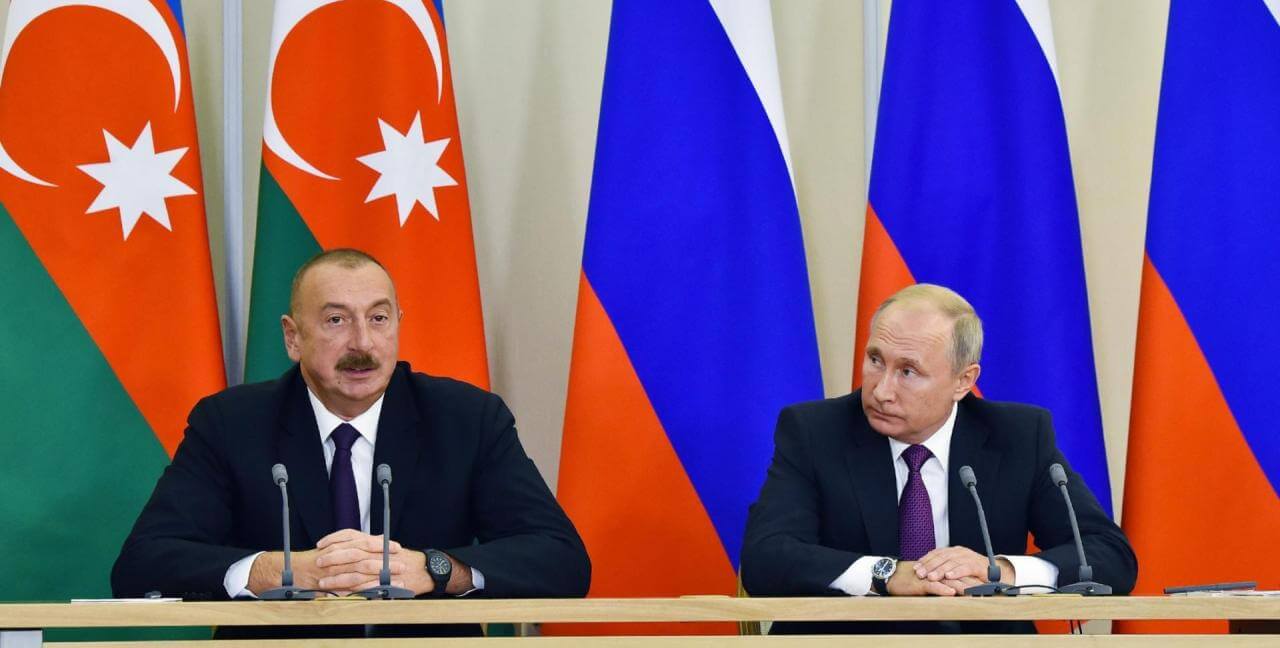In light of the growing concern surrounding the ongoing situation in Ukraine, where Moscow recognised the independence of the Donetsk and Luhansk regions, Russia has vowed to respect Azerbaijan’s territorial integrity. The announcement was made by Russian President Vladimir Putin during a meeting with his Azerbaijani counterpart Ilham Aliyev in Moscow on Tuesday.
During the meeting, the leaders signed a 43-paragraph ‘Declaration on Allied Interaction’ that seeks to greatly enhance Baku and Moscow’s cooperation in various fields, particularly in defence ties. The document states that both countries will strive to build relations by respecting the principles of “state sovereignty, territorial integrity and inviolability of the state borders.”
Furthermore, both sides agreed not to interfere in each other’s internal affairs and to refrain from the use of force in case of a dispute in the region. They also expressed their “readiness to hold urgent consultations” if an event that poses a threat to regional stability arises.
The declaration was signed just a day after Putin announced Russia’s recognition of the independence of the so-called Donetsk People’s Republic (DPR) and the Luhansk People’s Republic (LPR) in Ukraine’s Donbas region. Moscow also sent troops to the two breakaway regions, drawing international condemnation and raising fears of a full-scale invasion of Ukraine.
The declaration signed by Putin and Aliyev also stated that Russia and Azerbaijan will refrain from taking any actions that “damage” their strategic partnership. “To this end, they are establishing a permanent mechanism of consultations through the ministries of foreign affairs of the two countries,” the statement read.
LIVE: Russia's President Putin holds news conference with Azerbaijan's President Aliyev in Moscow https://t.co/aUTHSMTtYX
— PresserWatch (@PresserWatch) February 22, 2022
Furthermore, the agreement calls for greater military and defence cooperation. In this respect, the statement said that they “will deepen interaction” between their armed forces and hold “joint operational and combat training activities, as well as developing other areas of bilateral military cooperation.”
Moscow also vowed to enhance military-technical cooperation and provide modern weapons to Baku. “In order to ensure security, maintain peace and stability [both sides] may consider the possibility of providing each other with military assistance,” the statement added.
Additionally, they agreed to step up joint efforts to “counter and neutralise” the threats of terrorism, separatism, organised crime, and weapons and drug trafficking in the South Caucasus region. They also agreed to establish mechanisms to ensure the “security and stability” of the Caspian Sea region and respect the “sovereignty, sovereign and exclusive rights of coastal states, as well as the exercise of their jurisdiction in the Caspian Sea.”
Apart from signing the declaration, Putin and Aliyev held talks in the Kremlin, during which the Russian President stressed that he had no intention of reshaping the region’s borders. Stating Russia’s decision to recognise Donetsk and Luhansk, Putin told Aliyev that speculation about “Russia’s alleged intention to reinstate the empire within imperial borders […] has absolutely nothing to do with reality.”
“After the breakup of the Soviet Union, Russia recognised all the new geopolitical realities [and] is working actively to strengthen our interaction with all the countries, the independent states that emerged in the post-Soviet space,” he added. “I repeat, the situation with Ukraine is different, and this is related to the fact that the territory of this country is, unfortunately, used by third countries to create threats against the Russian Federation. This is the only explanation,” Putin asserted.
Even though Azerbaijan managed to secure a comprehensive victory over Armenia in the 2020 Nagorno-Karabakh war, mainly due to Turkey’s help, it has expressed concerns about Moscow’s military support to Yerevan. Armenia had used Russian military equipment, especially the Iskander ballistic missiles, against Azerbaijan, leading to numerous casualties and significant damage to infrastructure.
Against this backdrop, President Aliyev said that the signing of the declaration is a “dynamic development” and will “definitely have a very positive effect on our countries, our cooperation and on regional security.”

